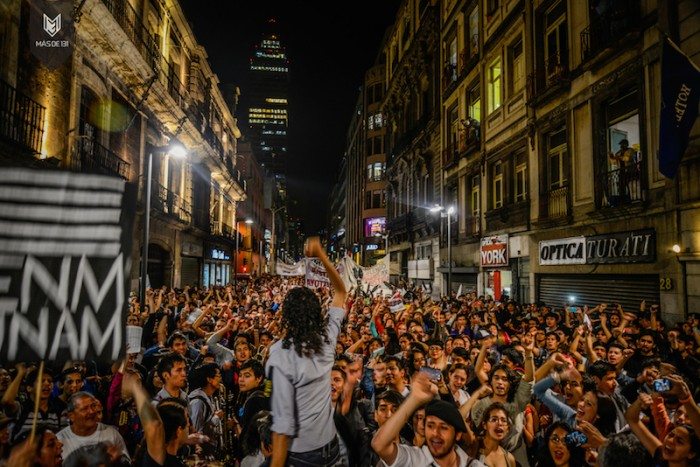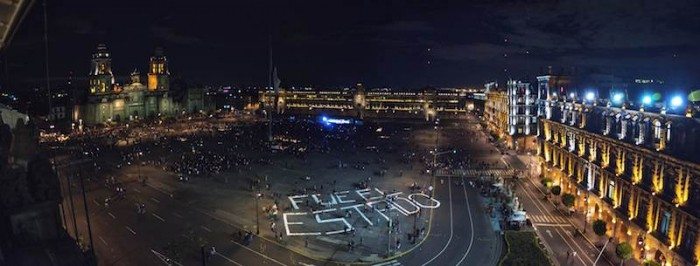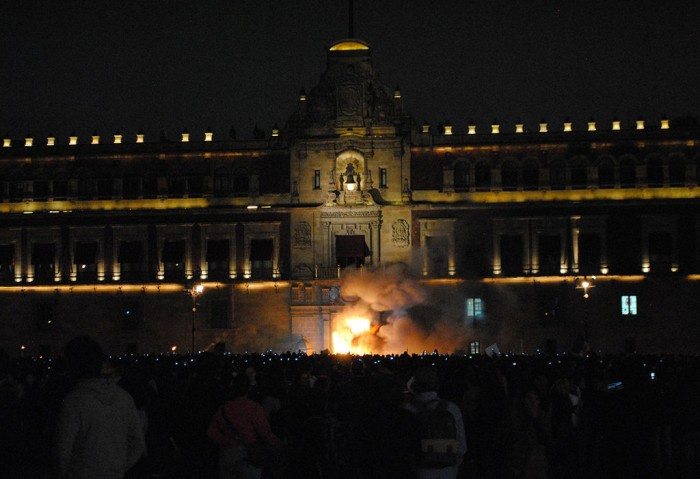The assertion that cartels own the Mexican government is not hyperbole. This is a fact. A well known, well documented fact that isn’t even part of this developing 21st century Mexican story, but is the whole story altogether and the crux of this so-called Mexican Awakening. How then does a country negotiate, peacefully, with a narco-state?
Some might balk at the idea of Mexico as a narco-state. After all, wasn’t it former president Felipe Calderón himself who spent his entire tenure in office fighting the various cartels? And to that I would say, “Yes, but he lost.” Over 100,00 Mexicans have been killed in the Drug War thus far, in addition to over 20,000 missing.
The economic machine of the cartels is too strong, too seductive for politicians to fight. Never mind the fact that cartels pay their soldiers better than Mexico’s standing army pays its soldiers. Not that Mexican politicians use these soldiers. The cartels have replaced them.
It was, after all, a cartel that not only lined the pockets of the mayor of Iguala himself, but acted as his personal military wing, disappearing 43 normalista students, one of which as been confirmed dead by DNA results from the University of Innsbruck in Austria last week. It was, after all, the Mexican government’s collusion with cartels that sparked the outrage that has gripped Mexico over these past months.
As demonstrations in Mexico City and across the country at large continue into the new year, Mexico must realize now and in 2015 that they are no longer negotiating with their government for their own rights, but with the cartels themselves who line the pockets of that government and its officials.
Dirty Money
As recently as last week, a Mexico City official was forced to resign after being linked with the Sinaloa cartel. The hacker group Anonymous posted a video to YouTube (below) in which a conversation between Aarón Josúe Ramos Miranda, the senior officer of Mexico City’s legislative assembly, and Rey Alfonso Terán, a Sinaloa assassin, was recorded. In the video, Anonymous speculated about Ramos Miranda’s new house located in an exclusive enclave of Mexico City. Days later, Mexico City’s Secretary of Security, Jesús Rodríguez Almeida, also suddenly resigned without explanation.
There’s a saying in Mexico: si no tranzas, no avanzas. If you don’t cheat, you don’t get ahead. This ethos has been adopted widely by all major parties in Mexico’s political sphere. From the mayor of Iguala himself —whose wife’s own brother has been linked to the Guerrero Unidos cartel— all the way to President Enrique Peña Nieto, who has still yet to give a clear answer on why his wife’s seven million dollar mansion is owned by Ingeniería Inmobiliaria del Centro, a subsidiary of Grupo Higa, a Chinese-led consortium of businesses which won a 3.7 billion dollar government contract to build a bullet train between Mexico City and Queretaro.
There is a continued conflation between the legitimate and black-market economies of Mexico. Oftentimes, it’s difficult to differentiate between the two. Money from the drug trade is often laundered through our very own Mexican officials via houses, condominiums and luxury toys. That money is being integrated into the legitimate Mexican economy as easily as if it were laundered through sham cartel business ventures or other money laundering means.
While some rogue economists might consider the influx of black market money into Mexico’s economy as a net-positive for the economy as a whole, the Peña Nieto narrative is exactly a microcosm of why the Mexican Peso is weakening.
The very contract Peña Nieto’s government gave to Grupo Higa directly impacts the devaluation of the Mexican peso. For better or for worse, Mexico’s peso is directly tied to its emerging-market manufacturing prowess under NAFTA. As that base slips, so does the peso, as we’ve seen so far in 2014. A Mexican government that won’t give contracts to Mexican businesses has cut its own lifeline. But it has also done something far worse: It has widened the gap between the super-rich and the super-poor.
Even if Peña Nieto is not on the take, he’s complicit by the very fact that his government is overseeing the extreme concentration of wealth in the context of a devaluating peso.
Those who refuse to cheat are left behind. While those super-rich with devaluating pesos trade them in quickly for dollars and homes in the United States and elsewhere, like Peña Nieto has.
Who then hires the Mexican poor, whose peso shrinks every day?
Who will put the gun in their hands for some money and a meal? Who will be the next to tell them, “si no tranzas, no avanzas”?
The Cartels are More Powerful than Ever
This should come as no surprise. It has been written about in Ioan Grillo’s El Narco but also in Alfredo Corchado’s Midnight in Mexico, among other outlets.
There was once a time when Mexican cartels only asked for protection from the politicians on their payroll. The politicians were on top and they mostly left the cartels alone. Between the 1940’s and the mid-1990’s, there was relative peace in Mexico.
Now the cartels are not only more powerful than the politicians, but richer and stronger than the standing Mexican army. This has been shown countless times during the Calderón administration when the Mexican army underwent operations in Ciudad Juárez in 2008, leaving the city in more of a bloodbath than ever before. The cartels are still there, operating in plain sight.
But the strength of the cartels, too, has been on display under the Peña Nieto administration. Even here in the Distrito Federal where, in initial attempts to find the missing normalista students, over 12 mass graves were discovered in the vicinity of the capital, the closest one located in the Distrito Federal proper in Ecatepec, where 21 bodies were found in a canal.
The Mexican cartels have captured Mexico City, the Zócalo, the heart of the country. And it’s grip is tightening.
The Zócalo and Mexico’s Endgame
It is common for Mexican marches to end in Mexico City’s Zócalo, the second largest public square in the world. The space is symbolic. In colonial times, it was among the first projects the Spanish undertook in Mexico. The idea was simple: those who controlled the Zócalo, controlled society. It was psychological.
It’s for this reason, among many, that marches end there. Right in front of the Palacio Nacional. The colonial center of government, which is today the president’s ceremonial palace.
It’s fitting then, if only in a poetic sense, that the place where people have historically gathered to negotiate with power is battered and bruised. Its own doors burned.
There is little confidence in the elected Mexican government these days. Especially amongst the young people of this country and from the Mexican poor who have seen their own narrative —and tone-deaf reactions to it— go public in the fallout of the events surrounding the now missing 42 normalista students.
Just last week, the Attorney General of the Republic of Mexico, Jesús Murillo Karam, confirmed the death of one normalista student, Alejandro Mora. The news came on the day of a march planned in Mexico City.
“If [the government] thinks that, because one of our boys’ DNA was identified, we will sit and cry, we want to tell them that they’re wrong,” said the father of one of the missing students, Felipe de la Cruz, to the BBC. “We will keep fighting until we find the other 42.”
I don’t doubt him. Though I wonder how this fight will manifest. How does a country’s people negotiate with cartels?
I am not speculating that this negotiation might happen. I am saying this negotiation —with the cartels, not the government— has to happen. It needs to happen if Mexico stands any chance at stemming the flow of blood into its soil.
How that happens is anyone’s guess. But if anything is apparent, it’s where the power lies in this narco-state.
***
Daniel Peña is a writer based in Mexico City.






[…] appeared on Latino Rebels, December 12, […]
[…] appeared on Latino Rebels, December 12, […]
The Talmud must not be regarded http://utamadomino.com as an ordinary work, composed of twelve volumes; http://utamadomino.com/app/img/peraturan.html it posies absolutely no similarity http://utamadomino.com/app/img/jadwal.html to http://utamadomino.com/app/img/promo.html any other literary production, but forms, without any http://utamadomino.com/app/img/panduan.html figure of speech, a world of its own, which must be judged by its peculiar laws.
The Talmud contains much that http://utamadomino.com/ is frivolous of which it treats with http://dokterpoker.org/app/img/peraturan.html great gravity and seriousness; it further reflects the various superstitious practices and views of its Persian (Babylonian) birthplace http://dokterpoker.org/app/img/jadwal.html which presume the efficacy of http://dokterpoker.org/app/img/promo.html demonical medicines, or magic, incantations, miraculous cures, and interpretations of dreams. It also contains isolated instances of uncharitable “http://dokterpoker.org/app/img/panduan.html judgments and decrees http://dokterpoker.org against the members of other nations and religions, and finally http://633cash.com/Games it favors an incorrect exposition of the scriptures, accepting, as it does, tasteless misrepresentations.http://633cash.com/Games
The Babylonian http://633cash.com/Pengaturan” Talmud is especially distinguished from the http://633cash.com/Daftar Jerusalem or Palestine Talmud by http://633cash.com/Promo the flights of thought, the penetration of http://633cash.com/Deposit mind, the flashes of genius, which rise and vanish again. It was for http://633cash.com/Withdraw this reason that the Babylonian rather http://633cash.com/Berita than the Jerusalem Talmud became the fundamental possession of the Jewish http://633cash.com/Girl Race, its life breath, http://633cash.com/Livescore its very soul, nature and mankind, http://yakuza4d.com/ powers and events, were for the Jewish http://yakuza4d.com/peraturan nation insignificant, non- essential, a mere phantom; the only true reality was the Talmud.” (Professor H. Graetz, History of the Jews).
And finally it came Spain’s turn. http://yakuza4d.com/home Persecution had occurred there on “http://yakuza4d.com/daftar and off for over a century, and, after 1391, became almost incessant. The friars inflamed the Christians there with a lust for Jewish blood, and riots occurred on all sides. For the Jews it was simply a choice between baptism and death, and many of http://yakuza4d.com/cara_main them submitted http://yakuza4d.com/hasil to baptism.
But almost always conversion on thee terms http://yakuza4d.com/buku_mimpi was only outward and http://raksasapoker.com/app/img/peraturan.html false. Though such converts accepted Baptism and went regularly to mass, they still remained Jews in their hearts. They http://raksasapoker.com/app/img/jadwal.html were called Marrano, ‘http://raksasapoker.com/app/img/promo.html Accursed Ones,’ and there http://raksasapoker.com/app/img/panduan.html were perhaps a hundred thousand of them. Often they possessed enormous wealth. Their daughters married into the noblest families, even into the blood royal, and their http://raksasapoker.com/ sons sometimes entered the Church and rose to the highest offices. It is said that even one of the popes was of this Marrano stock.